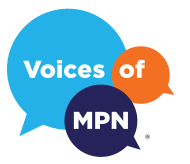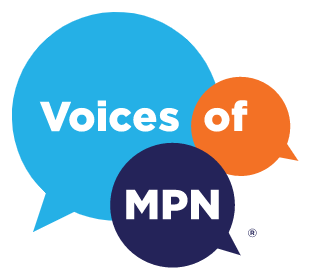Newly Diagnosed: Advice From People Who’ve Been There

Author: Voices of MPN
Being diagnosed with a myeloproliferative neoplasm (MPN) can cause a range of emotions—surprise, confusion, distress. You may even feel a certain degree of relief in knowing the cause of your unexplained symptoms. For some people, a diagnosis is one of the first chapters in their MPN story. Now what?
LEARN ALL YOU CAN
Everyone’s experience with MPNs is different. That’s why it’s important to take an active role in your well-being. Start by learning more about the type of MPN, its symptoms, and disease management options. Education resources and support groups are available online. You can also sign up for patient education webinars or attend local patient events that may be scheduled for your area.
FIND AN MPN SPECIALIST
It’s also important to partner with a Healthcare Professional who specializes in MPNs. A recently diagnosed patient living with PV, Runnette said, “My advice would be to find a hematologist you are very comfortable with ‘cause it’s gonna be a long road.”
Jennifer, a newly diagnosed patient living with ET, found an MPN specialist by continuing her efforts to get help for her symptoms. “I finally found connection, wisdom, and people who cared about helping me get answers. This led to a referral…from an empathetic oncologist determined to help me restore things as best he could.”
Read more here about the benefits of seeing an MPN specialist.
TRACK YOUR BLOOD COUNTS AND SYMPTOMS
As a newly diagnosed patient, you may find it helpful to track your disease. You can do this by monitoring your blood counts and symptoms with a resource like the Tracker Tools. Regular monitoring and medical care can help detect any changes in your condition.
Debbie, advises newly diagnosed patients to, “Get to know your doctor. Tell them how you’re feeling. Keep track of your symptoms.” Runnette agrees. “Track your numbers, keep a journal of how you are feeling day to day.”
CONNECT WITH YOUR SUPPORT COMMUNITY
Support for living with an MPN can be anywhere you find it—online, for instance on the Voices of MPN Facebook page or in patient support resources.
The patient meeting that Jennifer, a newly diagnosed patient living with ET, went to helped guide her next steps. “I would reach out and attend an LLS [Leukemia & Lymphoma Society] event in your area, and then try to meet people with your same condition and find out who they see if you live in the same area.”
A newly diagnosed patient living with MF, Benton said his family supported him during his challenges with MF. “Family has been with me for every doctor’s appointment.”
If you join a support organization such as a private Facebook group for MPNs, you can advocate for other patients in your community by sharing or forwarding resource material you find particularly helpful. No matter what you do, you should always remember that your Healthcare Professional is the best source of advice for you about your disease. Please see your Healthcare Professional with questions.
WORDS OF WISDOM: VOICES OF EXPERIENCE
So what other advice would patients living with an MPN give to people who were recently diagnosed with PV, ET, or MF?
The opinions expressed here represent each individual’s personal story with their MPN. Each patient is different and their experience with their MPN will be unique to them.
Related Articles

Barbara Reveals Hidden Struggles in a Film About the Impact of MPNs
Author: Voices of MPN
READ ARTICLE





